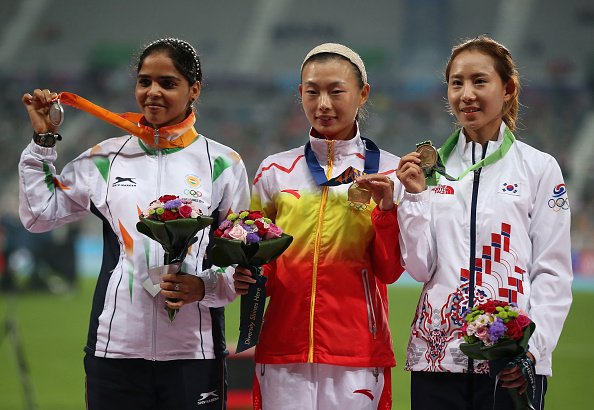It was a long journey from the cowshed to Asian games, says Khushbir Kaur

25-year-old Khushbir Kaur from Amritsar, whose claim to fame was a silver medal at the Asiad 2014, in Incheon, has stated that it was a very long and tough journey from the cowshed, where she stayed, to the Asian games. She had to face many hardships on her journey towards all her victories.
The 20km racewalker first came into the limelight by winning a bronze medal in the 10,000m walk race at the 2012 Asian junior Athletes championship that was held at Columbo. Since then, she has also participated in the 2013 World Championships where she finished 39th, with all the hard work eventually culminating in Incheon 2014 where she came third with a timing of 1:33:37. She also won a silver medal in the 20 km walking category in Incheon.
Kaur's reminisced the days when a cowshed was their home and the country's top racewalker, who won a silver at the Asian games, slept on a creaky charpoy. Her family had to regularly skip meals once or twice a day due to acute poverty. From the cowshed, they moved into a house that wasn't in a good condition either with the roof leaking during monsoons and they also had to accommodate their cows inside the house. The hardships that they had to go through are still fresh in the Kaur's mind, who is now a DSP of Punjab police.
"It has been quite a tough journey. We lived stashed with cows in a room,” Khushbir said to the TOI from Bengaluru, where she is attending a national camp for the upcoming Asian Games.
Kaur lost her father, Balkar Singh, when she was six and it was her iron-willed mother, who raised four daughters and a son by sewing clothes and selling milk in nearby villages.
"During the rainy season, my daughters, son, the cows and I all lived in a single room, stashed together. Now ask anyone in the village that you have to go to DSP Khushbir's house, all of them will tell you where to go," Khushbir's mother Jasbir Kaur added proudly.
Kaur’s mother was the only person who used to earn the bread and butter for the family after her husband's death. She has, however, taken up the responsibility of the leader of the house after starting to win medals at the national as well as international levels.
“It was only after Khushbir started winning medals and awards that we could afford a good meal. And after she won silver in the 20km race walk event at the 2014 Asian Games, we got a cemented roof over our heads," Jasbir said.
"My husband was an employee with the state electricity department. But after his death, my in-laws' family left me to survive with five young children - all on my own. But I didn't lose heart, I dedicated my life to raising my children and encouraged my daughters to study as well as be involved in sports. We had a couple of cows. I used to sell milk and then stitch clothes, but the income was not enough. The teachers at the school where Khushbir and her sisters studied would often help them - with studies as well as school fees,” Jasbir said while recalling everything about her past full of hardships.
Kaur's mother still has a couple of cows but the decaying, crumbling house has now turned into a modern pucca house. Signs of prosperity are visible. "My daughters are my pride. My message to anyone who indulges in female infanticide is: Remember, the girls saved the nation's pride in the last Olympics," Jasbir concluded.